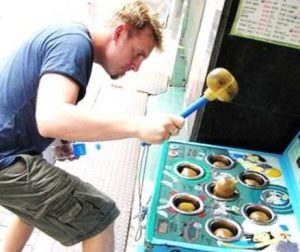All Physicians Should Engage In Pharmaceutical Whack-A-Mole: Please Follow Physiatry’s Lead
 Medical school prepares physicians to prescribe medications for prevention and treatment of disease, but little to no time is spent teaching something just as important: de-prescribing. In our current system of auto-refills, e-prescriptions, and mindless “check box” EMR medication reconciliation, patients may continue taking medications years after their original prescriber intended them to stop. There is no doubt that many Americans are over-medicated, and the problem compounds itself as we age. Although “no-no” lists for Seniors (a tip of the hat to the American Geriatrics Society “Beers List”) have been published and promoted, many elderly Americans are prescribed medicines known to be of likely harm to them.
Medical school prepares physicians to prescribe medications for prevention and treatment of disease, but little to no time is spent teaching something just as important: de-prescribing. In our current system of auto-refills, e-prescriptions, and mindless “check box” EMR medication reconciliation, patients may continue taking medications years after their original prescriber intended them to stop. There is no doubt that many Americans are over-medicated, and the problem compounds itself as we age. Although “no-no” lists for Seniors (a tip of the hat to the American Geriatrics Society “Beers List”) have been published and promoted, many elderly Americans are prescribed medicines known to be of likely harm to them.
You may be surprised to learn that one medical specialty has taken advanced steps to address this problem. Physiatry (also known as Physical Medicine and Rehabilitation or PM&R) is a national leader in pain management education, and is the author and promoter of the majority of continued medical education (CME) courses on reducing opioid prescribing in favor of alternative pain management strategies. But did you also know that most patients who are admitted to an inpatient rehabilitation facility (IRF) are tested on their capability to correctly administer their own medications before they are discharged home?
The MedBox test provides a validated cognitive performance assessment of whether or not an individual can correctly distribute multiple prescription medications into weekly pill boxes as directed on the containers. This is a short video of how the test works, demonstrated by some occupational therapists having a good time with it. In one fell swoop, this test checks vision, reading comprehension, pharmaceutical knowledge, manual dexterity, attention, and short term memory.
This test is very helpful in picking up potential misunderstandings in how prescription meds are to be taken, and identifying cognitive deficits that might preclude accurate self-administration of prescription meds at home. One of our main goals in rehab is to make sure that patients have the skills, assistance, and equipment necessary to thrive at home, so that they can remain hospital-free for as long as possible. To that end, we feel strongly that limiting medications to those only truly necessary, as well as making sure that patients can demonstrate safe-use of their medications (or have a caregiver who can do this for them), can reduce hospital readmission rates, falls, unwanted drug side-effects and accidental drug-drug interactions.
In addition to MedBox testing, physiatrists invite hospital pharmacists to join their weekly patient team conferences. While we discuss patient progress in physical, occupational, and speech therapies, we also review nursing assessments of medication self-administration competency, and ask our pharmacist(s) which medications can potentially be stopped or decreased that week. Rehab physicians (familiar with patient health status, goals, and current complaints) and pharmacists together come up with stop dates and taper regimens at these weekly meetings.
Part of the reason why inpatient rehabilitation has been so successful at reducing hospital readmission rates, in my view, is that we are committed to pharmaceutical whack-a-mole. “Test-driving” patient competency at medication self-administration, in the setting of responsible de-prescribing in a monitored clinical environment, is a highly valuable (though sadly under-reported) benefit of rehabilitation medicine. I hope that my medical and surgical peers will join us physiatrists in combating some of the patient harms that are passively occurring in our healthcare system designed to add, but not subtract, diagnoses and treatments.










